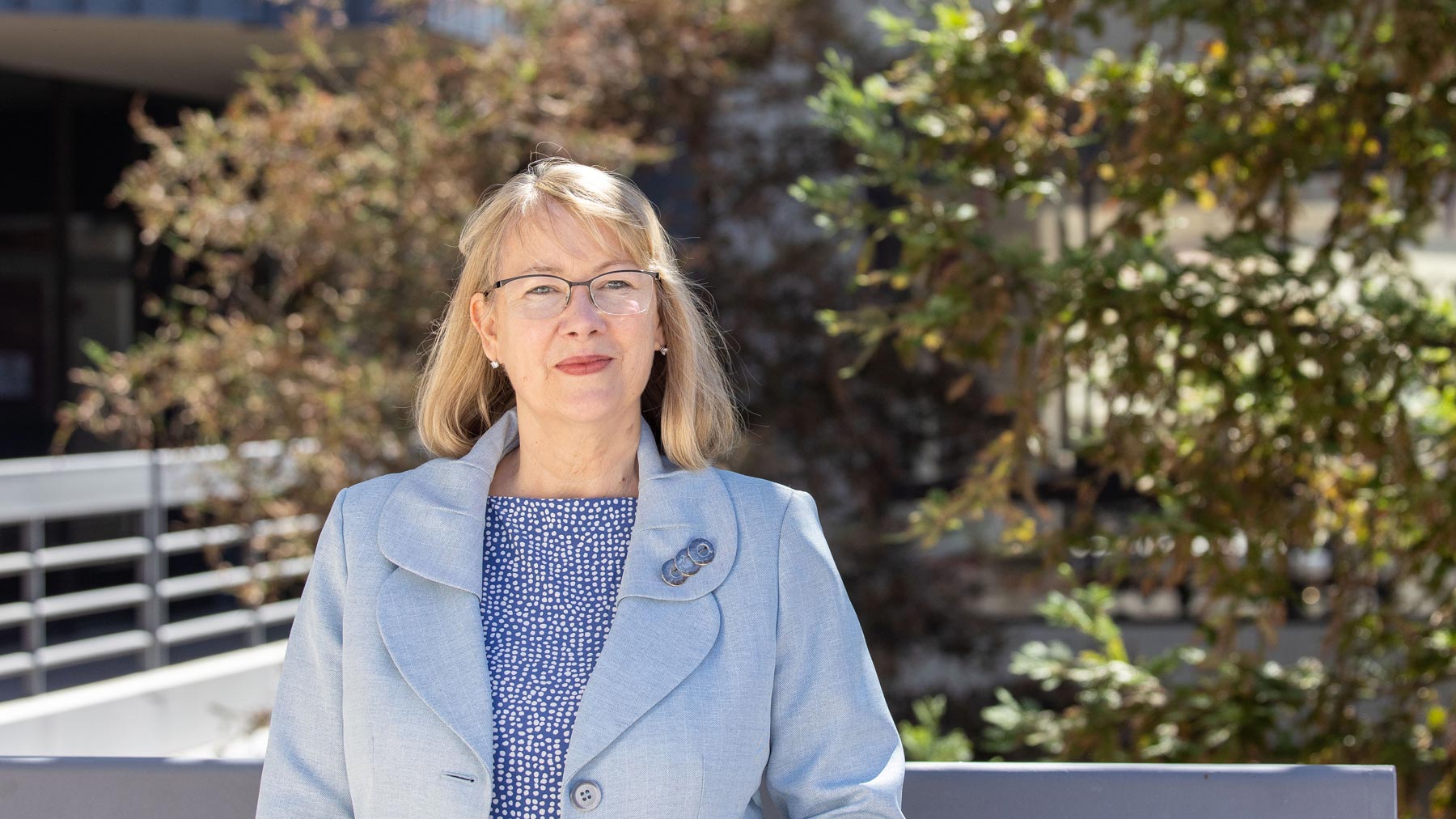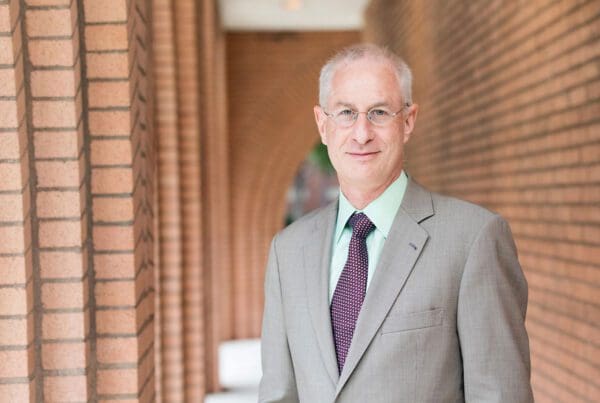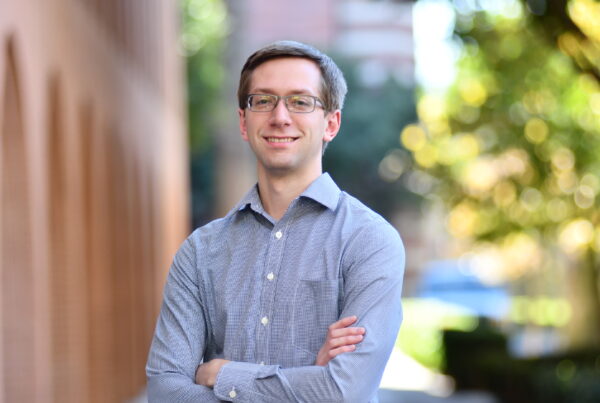Adria Navarro spent most of her childhood years in Southern California, living in a diverse household that included as many as four teenage foster youth at one time. She was introduced to the profession of social work as she saw the foster youth working through their needs with their assigned caseworkers, an experience that would prove to be formative for her when she first considered a career in health care.
“During a visit to a college career center, I learned that I could support and care for others, as I knew social workers did, within the field of health care. ‘Wow,’ I thought, ‘this is what I want to do!’” says Navarro. She has now been a licensed clinical social worker for more than three decades, all while working in health care settings along the continuum of care.
Navarro received her bachelor of arts in social welfare from California State University, Long Beach in 1981 and earned a master’s in social work from San Diego State University in 1983. She went on to work for Kaiser Permanente in San Diego as a social worker in home health, hospice and continuing care. While there, she helped launch a geriatric assessment clinic and worked on a team with a geriatrician, a nurse practitioner and a clinic coordinator to support older adults and connect them with services appropriate for their needs. She continued this mission as a clinical services coordinator at Huntington Hospital in Pasadena.
Seeking innovation in gerontology
After more than two decades of frontline experience helping her teams serve the needs of older adults, Navarro realized she could offer more to the field if she were able to teach and assist with building evidence on what interventions were beneficial to functionally impaired older adults.
“Given my experiences serving those most vulnerable in this demographic, I wanted to develop the skills to contribute more to the field,” Navarro says. “Residing in Los Angeles near USC, I was fortunate to guest lecture and attend continuing education at the Leonard Davis School of Gerontology. These experiences kept me informed and involved in some of the important discussions within the field.”
It was also during this time that various colleagues kept asking Navarro if she had ever met Professor Kathleen Wilber, Mary Pickford Foundation Chair in Gerontology at the USC Leonard Davis School, because of their common interests in the well-being and safety of older adults.
“I remember I was getting off an escalator at an American Society on Aging conference when I saw Kate Wilber,” Navarro recalls. “We met up there, and I was able to explain my goals for returning to school for a doctorate.”
Wilber, who became Navarro’s mentor during her PhD in Gerontology program, is the director of the Secure Old Age lab at the USC Leonard Davis School. Her expertise in elder abuse prevention and long-term services and support for older adults helped Navarro delve further into issues surrounding elder justice.
“Dr. Wilber recognized value in my experiences and saw my commitment to serving older persons,” Navarro says. “I had assessed elder mistreatment situations in my social work practice, in clinical supervision, and I’d worked in collaboration with Adult Protective Services (APS), but I hadn’t been able to focus on evidence about what interventions and policies were needed for the field.”
As a nontraditional student, Navarro appreciated that she was encouraged and empowered by the Leonard Davis School and by Wilber in particular.
“I experienced how Dr. Wilber pays attention to the goals and skill set of [each] student,” she says. “We have different strengths and are in different stages of our educational journey. I came in as a mature student, and I felt that my experiences in health care gave me a good foundation upon which to continue to learn and grow as a gerontologist.”
Evaluating decision-making capacity
During her PhD program, Navarro had the opportunity to work as an evaluator for the Los Angeles County Elder Abuse Forensic Center, an interprofessional and interagency collaboration founded to help resolve complex cases of alleged elder abuse in the county. She says it inspired her to think more about the complex domain of decision-making capacity — a person’s ability to make reasoned decisions regarding their medical, legal, financial or other everyday living choices — and how this factors into providing the greatest quality in care planning and intervention.
“I realized that capacity was something I had been discussing with other professionals and in clinical supervision for decades. I began appreciating through conversations with members of the Elder Abuse Forensic Center team just how critical it could be in reviewing alleged elder abuse cases, [and] discerning if elder abuse had occurred,” Navarro says. “Now, I find myself thinking about what is needed to improve access to diagnostic excellence for vulnerable persons, so professionals across many different disciplines can have a deeper understanding of how to serve their client or patient. I see this as a component of elder justice … [and] so critical to what interventions are going to be appropriate for someone.”
After receiving her PhD in 2011, Navarro conducted research and taught graduate social work students as an associate professor at Azusa Pacific University. She was also appointed assistant clinical professor in the Keck School of Medicine of USC Department of Family Medicine, which led to her consulting with the National Center on Elder Abuse and the Administration for Community Living.
Navarro is co-founder of the USC Verdugo Hills Hospital’s Community Resource Center for Aging (CRCA), launched in 2020. Staffed by social workers specialized in serving older adults, the center helps older people with quality of life by improving awareness and access. Callers are linked to a robust network of community-based services and support. Through options counseling, the staff assess each individual’s functional abilities and, to the extent possible, incorporate self-determination in care planning.
Navarro is also active in organizations such as the Pasadena Village, National APS Association, Gerontological Society of America and the National Association of Social Workers (NASW). Through her work in the community, as well as in educating future and current social workers, she says she hopes to “enhance our society’s response when assistance and even protections are necessary to maintain an older person’s preferences, well-being and safety.”
Establishing U.K. colleagues
To promote the use of professional decision-making evaluations in California, Navarro began exploring assessment tools and the use of evaluations in legal decisions. She served on the U.S. Department of Justice’s Capacity Work Group, during which time she found variability across states, with several that sanction social workers to provide capacity evaluations.
In California, legislation requires evaluations to be conducted by psychologists and physicians. Navarro predicts that with the state’s burgeoning older population, sanctioned professions will need to be expanded. Social workers are the largest providers of mental health services in the state, employed within many institutions of care, she explains. Her vision is to see licensed clinical social workers, with proper training and competence, evaluating decision-making capacity in health and legal matters. “Just looking at the rising number of Californians experiencing symptoms of dementia, we continue to see more situations where this type of evaluation is so critical,” she says.
Navarro’s interest in decision-making capacity will now be international, with the support of a prestigious 2022 Fulbright Scholar Award. The Fulbright U.S. Scholar Program offers over 400 awards in more than 130 countries for U.S. citizens to teach, conduct research and carry out professional projects around the world. As part of her award, Navarro will spend three months at the University of York in the United Kingdom to teach and review the practices of social workers in evaluating the decision-making capacity of older adults.
“I hope to learn more from U.K. researchers, and persons impacted, about their systems and policies that utilize social workers to evaluate the functional ability of older persons,” she says. “My goal from this cultural exchange is to return with fresh input for directly serving older adults in our state, as well as increasing my ability to further elder justice through greater education and training for the professional evaluation of decision-making capacity.”
Navarro hopes that in this next phase of her career she can help shape how social workers and other professionals connect with one another and work together to appropriately serve older adults, while preserving self-determination to the greatest extent possible. “We know that working together across disciplines leads to better outcomes,” she says, and the interprofessional components of the gerontology profession support these practices and ideals.
“I am fortunate and feel so privileged to have studied at the Leonard Davis School and to be part of an amazing community, one with such a rich foundation of resources,” she says. “My journey would not have arrived at this juncture if it wasn’t for my education at USC.”





